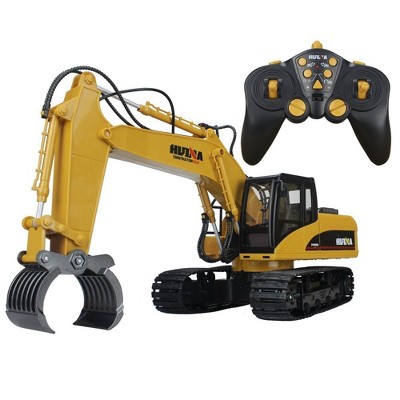Understanding Just How Excavator Works and Its Effect On Effectiveness
Excavators play a vital role in building and construction and mining operations, counting on an intricate interplay of hydraulic and mechanical systems. Their ability to execute a selection of tasks depends upon both their style and the technology incorporated within. Understanding these elements can greatly impact functional efficiency and efficiency. As advancements remain to improve the industry, one should consider exactly how these changes will certainly affect future practices and performance.
The Basics of Excavator Mechanics

The Duty of Hydraulic Systems in Excavators
At the heart of excavator operation exists the hydraulic system, which plays a pivotal function in powering the equipment's functions and motions. This system uses pressurized hydraulic fluid to transfer energy, allowing numerous activities such as digging, lifting, and moving. By taking advantage of the principles of hydraulics, excavators can do tasks with remarkable precision and force, improving total functional efficiency.The hydraulic system is composed of key components, including cylinders, shutoffs, and pumps, which work with each other to manage the circulation and instructions of the liquid. When the driver involves the controls, the hydraulic fluid is directed to specific cyndrical tubes, translating the operator's commands into physical movement. This mechanism permits receptive and smooth actions, which are vital in building and construction and excavation settings. double e volvo rc excavator. The performance of the hydraulic system straight affects the efficiency and adaptability of the excavator, making it an indispensable element in contemporary excavation processes
Key Elements of an Excavator
Comprehending the essential components of an excavator is necessary for comprehending exactly how this powerful equipment runs. An excavator is composed of a number of considerable components, including the undercarriage, residence, arm, boom, and container. The undercarriage gives security and mobility, usually featuring wheels or tracks to navigate numerous terrains. The home consists of the engine and hydraulic systems, permitting the driver to control movement and power the machine. The boom prolongs from your home, allowing vertical reach, while the arm links to the pail, assisting in digging and lifting operations.Additionally, the taxi houses the driver, equipped with controls for exact maneuvering. Each of these parts plays an essential duty in the excavator's general capability, adding to its effectiveness and performance on building sites. Comprehending these components aids in enhancing and maintaining excavator efficiency, guaranteeing jobs are completed safely and successfully.
Add-on Versatility and Its Benefits
Attachment adaptability is a vital facet of excavators, making it possible for drivers to switch between various tools tailored for certain jobs. This adaptability not only improves work efficiency however additionally contributes to cost-effectiveness by lowering the need for multiple makers. Recognizing the various sorts of add-ons readily available can greatly affect the total efficiency and performance of an excavator on task websites.
Sorts of Attachments
While excavators are primarily acknowledged for their digging abilities, their true adaptability depends on the wide array of attachments available. These attachments enhance the excavator's functionality, allowing it to perform various tasks past excavation. Typical accessories include pails (for excavating and scooping), hydraulic thumbs (for realizing materials), and augers (for drilling holes) Grapples are utilized for managing and moving debris, while rippers can separate hard surface areas. Various other specialized accessories, such as trenchers and plows, make it possible for excavators to adjust to particular job requirements. This diversity not just boosts the machine's utility across various fields, consisting of landscape design, demolition, and construction, yet likewise allows operators to customize their equipment to satisfy specific task needs effectively.
Increased Work Effectiveness
Making the most of work effectiveness is a primary benefit of using numerous excavator accessories. Various important source accessories allow an excavator to do multiple jobs without needing to switch tools, conserving useful time and labor. Utilizing a hydraulic hammer can damage concrete while a container attachment can dig deep into soil, allowing a smooth workflow. This flexibility lowers downtime related to equipment modifications and enhances performance on-site. Furthermore, specialized accessories boost precision in jobs such as grading or landscaping, causing greater top quality end results. The ability to adapt to various work demands not just improves procedures yet additionally reduces the demand for additional machinery, making certain that projects are completed quickly and properly. Overall, add-on versatility considerably adds to boosted task performance in excavation job.
Cost-Effectiveness and Convenience
Cost-effectiveness is a significant advantage of utilizing flexible excavator add-ons. These accessories enable a solitary excavator to do numerous jobs, minimizing the need for extra equipment and labor - double e volvo rc excavator. By switching over in between containers, hammers, and grapples, operators can tackle different projects, from digging to demolition, thus taking full advantage of devices utilization. This flexibility not only reduces functional costs but additionally lessens downtime connected with changing tools. Furthermore, the ability to tailor excavators with specialized accessories enhances productivity, as they can successfully manage varied jobs according to job demands. In conclusion, the mix of cost-effectiveness and versatility in excavator accessories contributes to enhanced functional effectiveness and resource allocation in building and construction and excavation projects

Advanced Innovation in Modern Excavators
Modern excavators are significantly furnished with sophisticated technology that changes excavation processes. Automation simplifies procedures, while boosted gas performance minimizes operational prices. Furthermore, smart control systems boost precision and safety, noting a substantial development in excavation equipment.
Automation in Excavation Processes
As excavation modern technology progresses, automation has become a vital component in improving efficiency and accuracy on task sites. Modern excavators are furnished with sophisticated automated systems that promote tasks such as grading, excavating, and trenching with very little driver intervention. These systems make use of sensing units, GPS, and machine discovering algorithms to assure accurate placing and depth control, substantially lowering the margin for error. In addition, automation enables drivers to concentrate on strategic decision-making instead of hand-operated controls, resulting in boosted efficiency in general. Such technologies not only simplify process yet likewise enhance safety by lessening human mistake in complicated procedures. The assimilation of automation in excavation procedures represents a substantial development in building modern technology, driving the market towards higher effectiveness and efficiency.
Boosted Gas Performance
Advancements in technology have likewise caused substantial enhancements in fuel efficiency for contemporary excavators. Modern machines are furnished with advanced engines that enhance power outcome while lowering fuel intake. These engines use ingenious combustion innovations, such as turbocharging and direct fuel injection, to enhance performance and efficiency. Furthermore, lightweight materials in construction reduce general weight, permitting less power expenditure during procedure. The intro of variable speed controls enables drivers to readjust engine performance according to particular tasks, further decreasing fuel usage. Because of this, these enhancements not only lower functional expenses however also add to ecological sustainability by decreasing emissions. On the whole, enhanced fuel effectiveness in excavators is a vital advancement that reinforces performance and financial practicality in the construction sector.
Smart Control Solution
While operators browse progressively intricate task websites, wise control systems in excavators have become essential devices for enhancing effectiveness and precision. These sophisticated technologies use sensors and formulas to keep track of numerous specifications such as lots weight, terrain problems, and operational efficiency. By automatically readjusting hydraulic features, smart systems maximize maker efficiency, resulting in improved efficiency and reduced endure components. Furthermore, drivers benefit from user-friendly interfaces that supply real-time feedback and diagnostics, enabling educated decision-making. This combination of technology not just simplifies operations however additionally minimizes human error, adding to more secure job environments. As the building sector continues to develop, wise control systems will play a crucial duty fit the future of excavator effectiveness and effectiveness.
Enhancing Operational Efficiency With Excavators
Excavators play a crucial duty in enhancing operational efficiency across various construction and excavation jobs. Their flexibility enables for several tasks, including training, excavating, and product handling, which simplifies operations and lowers the demand for added tools. With effective hydraulic systems, excavators can execute sturdy jobs with precision, significantly reducing the check over here time needed to complete projects. The assimilation of sophisticated Read Full Report modern technology, such as GPS and automated controls, even more optimizes their operation, allowing operators to attain higher precision and reduce product waste. In addition, contemporary excavators are developed to consume much less fuel and minimize discharges, adding to both price savings and environmental sustainability. By making use of excavators successfully, construction groups can improve efficiency, satisfy project target dates, and enhance overall website administration. This multifunctionality and efficiency make excavators indispensable devices in the contemporary construction landscape.
The Future of Excavators in Construction and Mining Industries
As the building and construction and mining markets evolve, the future of excavators is positioned for significant makeover driven by technological technology and altering functional needs. Developments in automation and synthetic knowledge are reshaping excavator abilities, permitting improved accuracy and performance in operations. Self-governing excavators are emerging, minimizing the need for human intervention and decreasing the risk of accidents.Moreover, the combination of telematics and IoT technology enables real-time tracking of equipment performance and anticipating maintenance, enhancing uptime. Environmentally friendly layouts, consisting of electric and hybrid versions, are acquiring traction, lining up with sustainability goals within the industry.Additionally, using advanced materials and lighter designs boosts fuel performance while preserving efficiency criteria. As these trends progression, excavators will certainly play a vital duty in fulfilling the enhancing needs for efficiency and safety in building and mining, ultimately changing functional landscapes.
Regularly Asked Concerns
How Do Weather Affect Excavator Efficiency?

Weather substantially affect excavator performance, as rain and mud can prevent grip and stability, while extreme temperatures may impact hydraulic systems. Operators should adjust to these variables to guarantee ideal performance and safety and security during operations.
What Precaution Should Operators Adhere To While Utilizing Excavators?
Precaution for excavator drivers consist of wearing suitable individual safety devices, performing pre-operation inspections, ensuring proper communication with ground workers, keeping a safe range from overhead dangers, and sticking to recognized functional protocols to avoid accidents.
How Typically Should Excavators Be Maintained for Optimal Efficiency?
Excavators ought to be maintained routinely to ensure peak performance, generally every 250 operating hours or as defined by the producer. Regular checks enhance dependability, stop unforeseen failures, and prolong the life-span of the equipment.
What Is the Typical Life Expectancy of an Excavator?
The average life-span of an excavator usually ranges from 10,000 to 15,000 hours of operation. Elements influencing durability consist of maintenance methods, running problems, and the quality of the device itself, affecting general productivity and performance.

Can Excavators Operate Irregular Terrain Effectively?
Excavators can run properly on unequal terrain because of their verbalized designs and adjustable tracks. These attributes enable them to maintain stability and grip, enabling efficient operation in challenging atmospheres commonly encountered in construction and landscape design jobs. Each of these elements plays an essential role in the excavator's overall capability, contributing to its performance and efficiency on building and construction websites. Making best use of task performance is a main advantage of making use of different excavator accessories. While drivers navigate increasingly intricate job sites, smart control systems in excavators have arised as vital devices for boosting effectiveness and precision. Excavators play an important duty in improving operational performance throughout various building and construction and excavation tasks. Breakthroughs in automation and artificial knowledge are reshaping excavator abilities, allowing for improved accuracy and performance in operations.